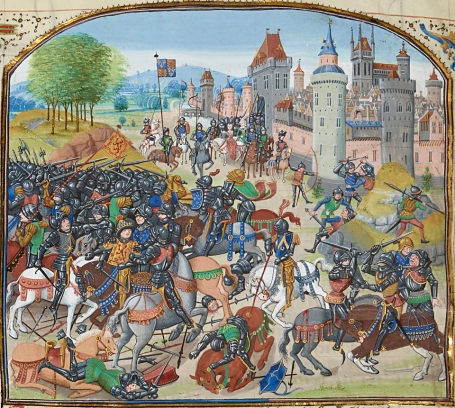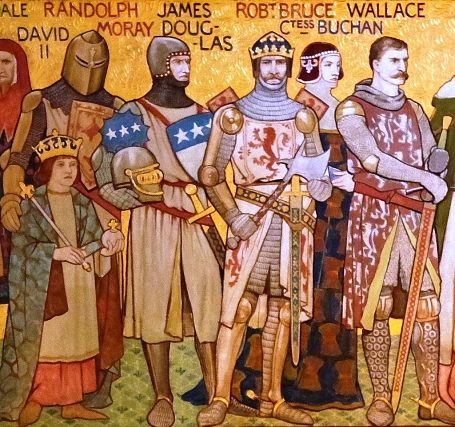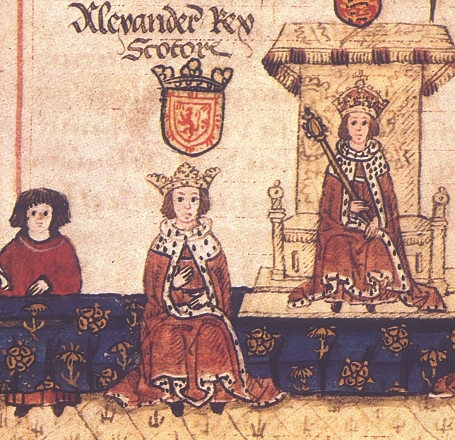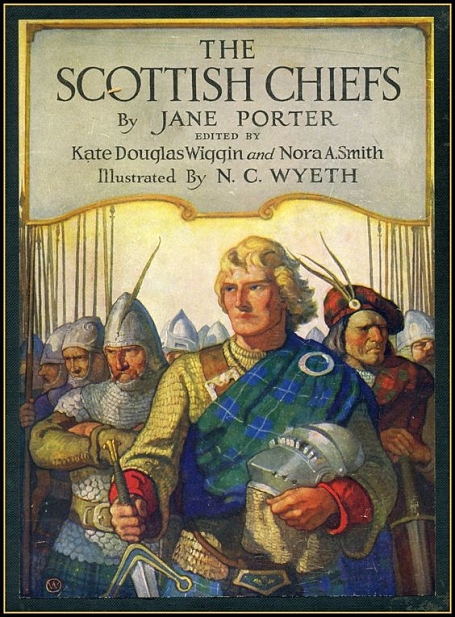The Life and Heroick Actions of the Renoun'd Sir William Wallace,
General and Governour of Scotland
by William Hamilton of Gilbertfield
Book I, Chapter IV
How WALLACE fish'd in Irvin Water.
Dreading no harm, nor danger of his Foes,
Wallace a fishing for Diversion goes
To try what Sport and Pastime he might get,
None with him but a Boy to bear his Net.
Lucky he was, fish'd most successfully,
Till the Lord Piercy, and his Court rode by:
Which did confuse, and much perplex his Mind,
Because he had forgot his Sword behind.
Five of that trooping Train in Garments Green,
Mounted on Horse-back, having Wallace seen
To him advanc'd, and blust'ring Language gave,
Then damn'd and swore, "Zounds, Scot, thy Fish we'll have."
With modest Grace good Wallace did reply,
"I'll share the half with you most cheerfully."
One of them answer'd that would be too small;
Then lighted down, and from the Boy took all.
Which in his Knapsack speedily he puts,
The meikle sorrow be in's greedy Guts.
Then Wallace said, "I'm sure in Modestie
You'll leave us some if Gentlemen you be;
An aged Knight that lives in yonder House
Let him have some, pray, be so Generous."
The Cloun, he boasting, said not one Word more,
"The River has enough behind in store:
We serve a Lord shall Dine on them e'r long."
Then Wallace fretting, said, "Thour't in the wrong."
"Whom thou's thou here, Faith thou deserves a Blow
Poor prating Scot, how darest thou talk so."
Then at him runs, and out his Sword does draw,
But Wallace Poult-staff kept the Rogue in aw.
That trusty Tree as the poor Scoundrel found,
Lay'd him and Sword, both quickly on the Ground:
Wallace the Sword caught fast into his Hand,
Which did the saucy Fellow soon command:
Then a back stroak so cliverly he gave,
His Neck in two most cleanly there he clave.
The other Four alighting from their Horse
Do him attack; with all their Strength, and Force,
Yet tho' they him surround on ev'ry Side,
With handy Blows he pay'd them Back and Side.
Upon the Head so fierce he struck at one,
The shearing Sword cut thro' his collar Bone:
Another on the Arm that stood near by,
He struck; till Hand and Sword on Field did ly.
Three slew he there, two fled with all their Might
Unto their Horse in a confounded fright:
Left all their Fish, no longer durst remain,
And Three fat English Boucks upon the Plain.
Thus in great hurry having got their Cuffs,
They scamper'd off in haste to save their Buffs.
When Piercy knew by the poor silly Lowns
That Three were kill'd, and saw Two bloody Crowns,
He quickly ask'd how many Foes might be.
They said but One, a Devil sure was he.
"Since One has killed Three, put Two to flight,
Cowardly Coxcombs pack you out of sight:
Most mast'fully it seems the Scot has fought,
For me this Day in Faith he's not be sought.
Was't ever heard before, you Whore-Sons Burds,
That a Scots Poult-staff foil'd Five English Swords?"
To Wallace I return who by meer force
Defeat the Five and pickt up all their Horse:
Was better mounted than he was before,
Rode to his Uncle, fish'd that Day no more.
The News did so surprise the ancient Knight,
He almost fainted in his Nephews sight:
Then bids keep secret: "For such fishing sport
If it be known you may pay dearly for't."
"Uncle," said Wallace, to the good old Man,
"I'll push my Fortune now where best I can:
Since I no longer may with you abide,
I'll try these English Geldins how they ride."
A Purse of Gold, the Knight unto him gave,
Wallace kneel'd down, and humbly took his leave.
"When that is done, pray Nephew send for more."
Thus ends the First Book, here I draw my Score.
The ballad, The Life and Heroick Actions of the Renoun'd Sir William Wallace, General and Governour of Scotland, by William Hamilton of Gilbertfield, 1722, is in the public domain.

The Kingdom of England and the Kingdom of Scotland fought dozens of battles with each other. They fought typically over land, particularly Berwick-Upon-Tweed, and the Anglo-Scottish border frequently changed as a result. Read more at Wikipedia.

The First War of Scottish Independence was the initial chapter of engagements in a series of warring periods between English and Scottish forces lasting from the invasion by England in 1296 ... Read more at Wikipedia.

Edward I (1239-1307), also known as Edward Longshanks and the Hammer of the Scots, was King of England from 1272 to 1307. Read more at Wikipedia.

Digitized version of The Scottish Chiefs, by Jane Porter, a novelization published in 1921 by Charles Scribner's Sons, about William Wallace and the First Scottish War of Independence. Read online at archive.org.